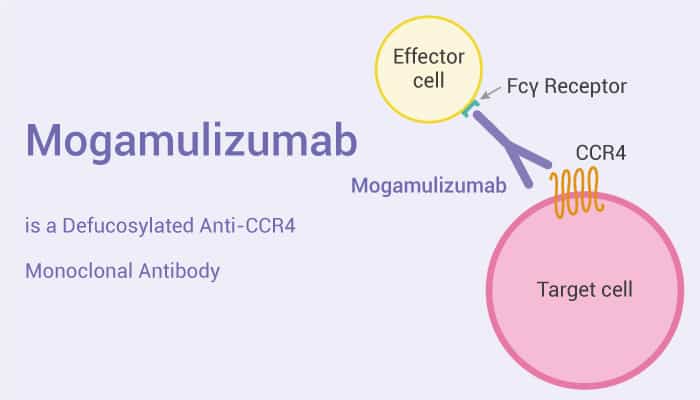C-C Motif Chemokine Receptor 4 (CCR4) is a G-coupled-protein receptor for C-C chemokines. It’s on surface of tumor cells in leukemia and lymphoma patients. For example, adult T-cell leukemia-lymphoma (ATLL), peripheral T-cell lymphoma (PTCL) and cutaneous T-cell lymphoma (CTCL) all expresses CCR-4. Furthermore, leukemia and lymphoma are clinically and genetically heterogeneous hematopoietic cancers. And these cancers infect millions of people worldwide. Noticeably, CCR4+CD8+ T cells can suppress inflammation and play a key role in chronic inflammatory diseases. Therefore, CCR4 is an important target for immunotherapy for cancers. Obviously, it is necessary to find out more CCR4 inhibitors for leukemia and lymphoma research. Researchers have found out a potent Anti-CCR4 monoclonal antibody (mAb), Mogamulizumab.
Mogamulizumab is an anti-CCR4 monoclonal antibody with anti-inflammatory and antineoplastic activities.

Mogamulizumab is a defucosylated humanized anti-CCR4 IgG1 mAb. Importantly, Mogamulizumab is effective against leukemia and lymphoma, such as ATLL, PTCL and CTCL. Specifically, It’s able to bind with Fcγ receptor IIIa (FcγRIIIa) on NK cells, thereby killing tumor cells by antibody-dependent cellular cytotoxicity (ADCC).
In vitro, Mogamulizumab (10 μg/mL, 24 h) induces ADCC activity against several CCR4-positive cell lines (SNT8, SNT16, SNK6, and KAI3). In PBMCs from patients with HTLV-1-associated myelopathy/tropical spastic paraparesis (HAM/TSP), Mogamulizumab (10 μg/mL for 3 days) reduces the human T-lymphotropic virus type 1 (HTLV-1) proviral load and inhibits PBMCs proliferation. Besides, it also eliminates the CD4+CCR4+ T cells in cultured PBMCs.
As for in vivo, Mogamulizumab (1 mg/kg, i.p., twice per week for 4 weeks) inhibits the tumor growth in a murine EBV-positive NK-cell lymphomas xenograft model. It also inhibits tumor growth in canine bladder cancer-engrafted mouse model when given at 0.1 mg/kg (i.v., every other day). Similar to the effect in vitro, Mogamulizumab (0.01-1 mg/kg, i.v.) reduces circulating CD4+CCR4+ T cells with no adverse effect in dogs.
Above all, Mogamulizumab is a defucosylated IgG1 monoclonal antibody that targets CCR4. Moreover, it can enhance its antibody-dependent cellular cytotoxicity via high-affinity binding with the Fc receptor. Mogamulizumab can be used in the research of leukemia.
References:
[1] uvic M, et al. Ther Adv Hematol. 2016 Jun;7(3):171-4.
[2] Yamauchi J, et al. J Infect Dis. 2015 Jan 15;211(2):238-48.